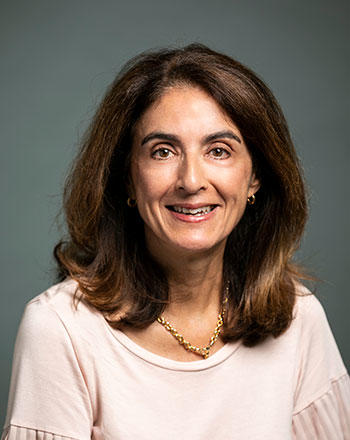In This Story
Years spent engaging with consumers in the business world made Niki Vlastara realize that how sustainability concepts and proposals were marketed significantly influenced how successful they became. As she worked her way into academia and eventually to the George Mason University School of Business it’s been her focus to study how to best engage and convince both customers and corporations to act with people, planet, and prosperity in mind.

Vlastara, an assistant professor in the Marketing Department, joined the School of Business in 2019. Her research interests focus on consumer behavior, consumer ethics and sustainable development— making her a perfect member of the Business for a Better World Center (B4BW) Affiliate Faculty team. Before entering academia, she held different executive positions in marketing and revenue planning in the leisure industry and served as a consultant in business development for startup ventures, developing their marketing strategy and communications plans.
Recently, we had the opportunity to catch-up with Vlastara to learn more about her journey to the business for good space, and how his research contributes to the cause.
What motivated you to start working in the sustainability space?
Before transitioning into academia, I spent a number of years in business—particularly in executive positions. In those roles, I was involved in streamlining and introducing sustainability into our operations and marketing department in order to minimize costs and waste. Years later, after I had started my PhD, I realized that change is most possible and achievable when all stakeholders are involved. Moreover, I came to understand that people must be convinced of the benefits a new or different approach will bring—such as acting in a sustainable way—before they will change their behavior. That is the main reason my research, both then and through today, is focused on consumer behavior, and, in particular, examines the intersection of the ethics of consumption and sustainability. I believe understanding what motivates changes in customer behavior may lead us to identifying more effective ways to communicate both the urgency, and the benefits of sustainable behavior. Ideally this will result in a more sustainable and equitable future for all.
What can you tell us about your ongoing research?
The United Nations World Commission defines development as sustainable if it meets the needs of the present without compromising the ability of future generations to meet their own needs. I am very motivated to contribute to efforts that will help ensure that kind of development increases. Consequently, my research pays close attention to the messages consumers and corporations alike receive on that issue. Trying to define what affects the future is in itself difficult, and I have been trying to determine how to characterize, outline, and describe a future with increased risk due to climate change, and how that to make the message understandable, relevant, and pressing enough to motivate change in consumer behavior.
But you’re doing more than just research, can you describe some of your other activities?
I am part of the Centre for Research into Sustainability, which is a group of academic researchers in accounting, finance, marketing, management, and operations management that work on sustainability issues. In addition to my affiliation with B4BW, while at Mason I also joined the Institute of Sustainable Earth because I believe that sharing and cooperating through disciplines can provide a wealth of original ideas and courses of action to achieve our goals. In that same vein, my being part of the Gender and Consumer Behavior group of academic researchers has provided me with a more inclusive and diverse way to approach certain subjects and problems in business.
Before coming to Mason, I was on board of the Miami Chapter of U.N. Association where I helped promote the U.N. Sustainable Development Goals to the local community, corporations and education centers.
Niki, thank you so much for your work in this field and your commitment to B4BW. What could we be doing to support you and your colleagues’ research and other efforts?
I believe that B4BW is offering tremendous value serving as a platform for discussions, the exchange of ideas, and most importantly by spearheading ways for action. Looking to the future, the development of a minor based on the principles espoused by B4BW would help ensure our students and faculty truly think about these issues differently, and help create a better world indeed.
